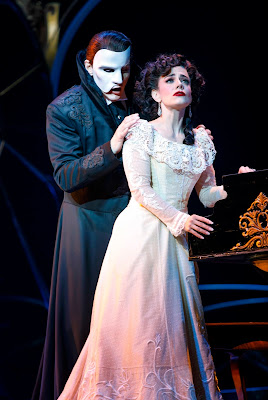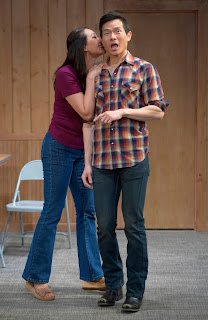 |
| James Carpenter as Alex and Sarah Grace Wilson as Georgie have dinner in "Heisenberg." (Photo by Kevin Berne) |
Things
aren’t always as they seem in Simon Stephens’ “Heisenberg,” presented by
American Conservatory Theater.
In this
two-person drama, a 42-year-old single woman, Georgie Burns (Sarah Grace
Wilson), ingratiates herself with a 75-year-old single man, Alex Priest (Bay
Area treasure James Carpenter), after kissing him on the back on the neck in a
London train station.
She says
she mistook him for her husband, who had died 18 months ago.
However, when she
unexpectedly visits him in his butcher shop a few days later, she admits that
was a lie. In fact, much of what she tells him is a lie.
Nevertheless,
he’s intrigued enough to ask her out on a date –- at her request. Before long,
they’re in bed together.
It seems
that her original intent was to get him to give her money to go to New Jersey
to search for her estranged 19-year-old son, who probably isn’t a fabrication.
Despite
that ulterior motive, the two of them grow to care about one another. In some
ways, their relationship is an attraction of opposites. In addition to the
obvious difference in their ages, she’s a nonstop talker, while he’s more
taciturn, a solitary man given to thinking before he speaks.
Still, they
appear to be good for each other. She helps him to become more spontaneous and
open to possibilities, while he becomes a steadying influence for her.
The play’s
title, “Heisenberg,” comes from a theory postulated by German physicist Werner
Heisenberg in 1927. Although his theory relates to physics, it also relates to
human behavior.
According
to an article in the “Words on Plays” that accompanies this production, playwright
Stephens said, “If you’re carefully watching where somebody is going or what
someone is doing, the likelihood is –- you never properly see them.”
This
uncertainty theory relates to Georgie and Alex because each is surprised by
what the other does next despite watching closely.
As directed
by Hal Brooks, Carpenter is superb as Alex undergoes his gradual
transformation. Wilson doesn’t do quite as well, perhaps because Georgie is
hard to like, especially at first, but she, too, changes gradually.
Alexander
V. Nichols, who also designed the lighting, has created a minimalist set where
some set pieces rise from below the stage or where two wooden chairs can be
connected to form a bench.
Costumes
are by Meg Neville with sound by Brendan Aanes.
Running
about 90 minutes with no intermission, “Heisenberg” will continue through April
8 at ACT’s Geary Theater, 415 Geary St., San Francisco. For tickets and
information, call (415) 749-2228 or visit www.act-sf.org.









